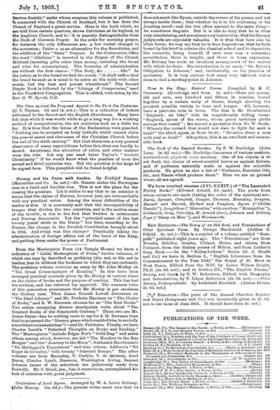does not much like Byron, outside the covers of his
poems, and not always inside them ; that whether he is in his confessing or his „boasting mood—and the two often amount to the same thing— he sometimes disgusts. But it is idle to deny that he is often very entertaining, and sometimes very instructive; that his literary judgments are especially valuable. It is true that here also he 'often bores; we may see that he is eiew ateeneuiveree, that he feels bound by his brief to admire the classical school and to depreciate he romantic, being himself, if ever man was, a romantic ; nevertheless, there is insight, and there is terse expression. Mr. Bettany has made an excellent arrangement of the matter with which ho deals. His introduction is an essay, "On Byron's Obligation to Johnson," and, incidentally, on his practice of quotation. It is very curious how many very different tastes seem to find a meeting-point in Johnson.










































 Previous page
Previous page